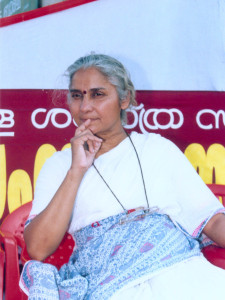 To
To
The Prime Minister,
Government of India
New Delhi
Hon’ble Prime Minister Mr. Modi,
We, the representatives of people’s movements and other civil society organisations, would like to bring to your notice certain pertinent issues regarding the Asian Infrastructure Investment Bank (AIIB).
India is one of the founding members that has played a crucial role in the formation of AIIB right from its announcement and is the second largest investor of the Bank. With its membership ratified on 11th January, 2016, India was elected to the 12 member Board of Directors with 10.34% voting rights on 16th January, 2016 and now also shares the Vice Presidential post and the post of Chief Investment Officer. It is unfortunate that the ratification of India’s membership to the Bank was done without a public debate. This deprives the citizens of a platform to raise their concerns and apprehensions about the functioning of the Bank, while the impact of the investments would be borne by the them. There are news reports stating that India would receive half of the $1.2 Billion the bank would disburse for infrastructure projects by the end of 2016. Further we are aware that AIIB has promised quick disbursal of funds with ‘high efficiency at low cost’ and takes pride in its ‘lean, green and clean’ policy. While the Bank seems a little too eager to start its investments, the same does not reflect on ensuring a strong set of safeguard policies.
At this juncture the AIIB is to finalize its Environmental and Social Framework (ESF) and we strongly feel that this demands a serious debate. We would also like to remind you that the first draft proposal negotiations were all on-line and only in English, leaving a large number of people out of the consultations. There were no face-to-face consultations. Further, the draft itself came under criticism for outsourcing the responsibility for Environmental and Social Standards to the clients and for looking at ESF as risk management among other things.
The need for infrastructure development is one that cannot be discounted in a rapidly growing economy like our country. These developmental projects would have the positive impact that the government wishes, only when proper safeguards and accountability mechanisms are in place. This could only be achieved if the new banks, especially AIIB, moves away from the traditional thinking that safeguards are merely risk management measures and have them as mere formalities. The launch of SDG and the agreements in Paris by now make it clear that economic ambitions cannot be achieved by endangering the environment. In a country that houses large populations that have been displaced without proper rehabilitation and facing serious and irreversible damages to its natural resources cannot afford to repeat the same mistakes.
In short, we would like to urge you to:
- Ensure an open debate both within and outside the Parliament on role in and implications for India, and Environment and Social Framework that the Bank would uphold.
Insist on face to face consultations with the civil society groups during all stages of finalizing the ESF
The safeguards should match the international best practices, and legally binding on member states
Ensure independent accountability mechanism in AIIB, to look into the non-compliances of policies.
Ensure proper consultations with people likely to be harmed and seek their free, prior and informed consent before investing in large infrastructure projects.
Banks with focus on investing in infrastructure need to ensure that the investments do not bring in displacement and deprivation to the poor and vulnerable communities. We demand that the government should take appropriate measures to adopt a transparent process while making AIIB operational.
Signed by:
1. National Alliance of People’s Movements
2. Narmada Bachao Andolan
3. National Fish workers’ Forum
4. Indian Social Action Forum
5. International Rivers
6. Samajvadi Samaagam
7. Socialist Front
8. South Asia Network on Dams, Rivers & People
9. All India Kabaadi Mazdoor Mahasangh
Bharat Jan Vigyan Jattha
Krishak Mukti Sangram Samiti, Assam
Delhi Forum, New Delhi
Bhumika Women’s Collective, Telangana
Campaign for Peace and Democracy, Manipur
Domestic Workers Union, Karnataka
Feminist Learning Partnerships, Haryana
Garment Labour Union, Karnataka
Global Human Rights Communications
Hazards Centre, New Delhi
Indigenous Perspectives, Manipur
Institute for Democracy and Sustainability, New Delhi
Machchhimar Adhikar Sangharsh Sangathan, Gujarat
Maatu Jan Sangathan, Uttarakhand
Manthan Adhyayan Kendra, Maharashtra
Odisha Chas Parivesh Suraksha Parishad, Odissa
Public Finance Public Accountability Collective
The Research Collective, New Delhi
Jan Jagran Shakti Sangathan, Bihar
Jan Sangharsh Vahini, Delhi
Khudai Khidmatgar, Haryana
Kisan Sangharsh Samiti, Madhya Pradesh
Kosi Navnirman Manch, Bihar
Lok Shakti Abhiyan, Odisha
Niyamgiri Suraksha Samiti, Odisha
Paryavaran Mitra, Gujarat
Paryavaran Suraksh Samiti, Gujarat
Srijan Lokhit Samiti, Madhya Pradesh
Tamilnadu Pondy Fisherpeople Federation
Unorganised Sector Workers Federation, Tamilnadu
Environics Trust, New Delhi
Environment Support Group, Bangalore
Leave a Reply